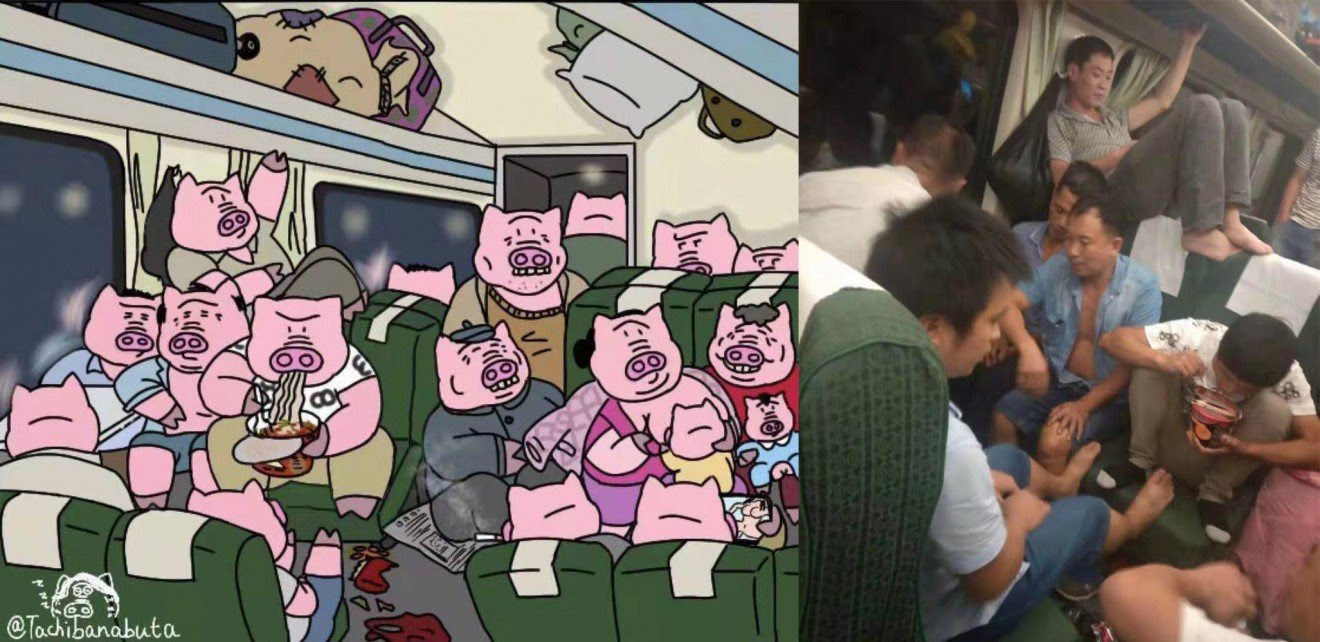Spiritually Japanese
« previous post | next post »
A cartoonist and her collaborator have been arrested in China for being "spiritually Japanese" (jīng Rì 精日). They have also been accused of "insulting China" (rǔ Huá 辱华). The latter term is transparent, and I've been hearing it a lot for the last couple of decades, whereas the former term is morphologically more difficult to understand (lit., "spirit Ja[pan]") and is new to me.
- "Chinese Cartoonist, Collaborator Arrested for Unpatriotic Comics: Authorities say the pair shared hundreds of comics online that ‘twisted Chinese history’", Hoi Ying Lo, Sixth Tone (7/30/19)
- "Chinese cartoonist detained by police for ‘insulting China’", Qin Chen, Inkstone News (7/31/19)
We know these two individuals only as "Zhang", a 22-year-old woman from the east central province of Anhui, and "Lu", a 36-year-old male who was detained in the northern city of Dalian. Their social media accounts have been wiped clean from the internet, and they themselves have been disappeared by the police.
Here's an example of one of the hundreds of offending cartoons that the pair shared, together with the typical train car scene upon which it was based:
You will note, in the bottom left of the cartoon, that the artist signs her name as "@Tachibanabuta". Tachibana, written with the kanji 橘 or 立花, is a fairly common surname in Japanese, and "buta" means "pig", so the artist is referring to herself as a pig. Although "@Tachibanabuta" is her Twitter handle, the account has been suspended, so you won't be able to reach her via that name.
In recent years, there have been countless instances of foreigners insulting China (and supposedly all of the Chinese people too), with the Chinese government demanding an apology. Perhaps the most famous example of such a mega-slight by a foreigner was the gigantic Dolce & Gabbana eating pizza with chopsticks advertisement flap. This was followed by "an Instagram conversation in which Gabbana apparently called China a 'country of [poop emojis]' among other insults. (Gabbana subsequently claimed his account had been hacked.)" See:
- "Can Dolce & Gabbana Recover from Its Mistakes in China?", Wharton podcast (12/11/18)
- "Insults, insults, and more insults" (11/23/18)
It's bad enough when foreigners offend China, but when a Chinese does it, that is tantamount to treason. This Twitter thread (from Taiwan) purportedly includes the PSB (Public Security Bureau) announcement regarding this incident and also provides some more samples of the artist's work.
The "Pig Nation Dream" (zhūguó mèng 猪国梦) cartoon probably didn't do much to help the artist's situation. In any event, there's no doubt that Zhang & Lu are members of the jīng Rì 精日 ("spiritually Japanese") subculture in China, and they are no doubt paying a heavy price for it right now.
Another expression that has been circulating in connection with "jīng Rì 精日" ("spiritually Japanese") is "Rì zá 日杂" ("Japanese gubbins / oddments"), which refers to those inconsequential, miscellaneous manifestations of Japanese culture that certain Chinese make much ado over. Both of these terms, along with rǔ Huá 辱华 ("insulting China"), have come together in the Zhang & Lu case.
Despite government discouragement of Japanophilia, it is a fact of life among many young Chinese. How does this happen? The answer is easy: anime, manga, Hello Kitty and her countless congeners, music, fashion, and the list goes on and on. I have been amazed at how many of the M.A. and Ph.D. students who come to my department from the PRC are totally enamored, even enraptured, by things Japanese. Even though there is little incentive and few resources for learning Japanese in primary and secondary schools, quite a few or our students from China have excellent Japanese language skills.
[Thanks to Mark Metcalf, Yana Way, Zeyao Wu, Jolyon Thomas, Frank Chance, and Ayako Kano]

Frank L Chance said,
August 3, 2019 @ 3:10 pm
I would not want to make too much of it, but the name "Tachibanabuta" may have been inspired by one of two Tachibana Takashi personalities. Less likely is a link to 立花孝志, journalist turned activist who leaked information about NHK funding scandals more than a decade ago. On the other hand another Tachibana Takashi, 橘孝志, comes up as the creator of definitely not-safe-for-work (and frankly rather disturbing) erotic graphic stories (ero-manga), including one whose title is translated into English as "I Was Raped by My Stepfather and His Pig!" One place you can read it is at https://d-upp.net/s/59090/ but lots of caution is required if you look past the first page.
Victor Mair said,
August 3, 2019 @ 9:21 pm
From Tanner Greer:
I have reported a few times about younger Chinese’s attraction to Japanese pop culture, why this attraction exists, how the Japanese government has tried to take advantage of this, and the Communist Party’s response to it all:
https://foreignpolicy.com/2019/01/23/super-patriotic-anime-youth-wars-china-japan-pop-culture/
https://chinachannel.org/2019/04/12/2d/
https://scholars-stage.blogspot.com/2019/04/the-inner-life-of-chinese-teenagers.html
There is a s soft power ‘war’ between Japan and the Communist Party going on over the minds of China’s young. Those pieces try to provide some context for what is happening.
Victor Mair said,
August 3, 2019 @ 10:32 pm
She goes by 橘豚, not 立花豚。